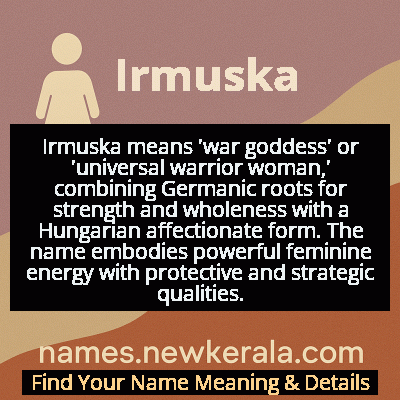Irmuska Name Meaning & Details
Origin, Popularity, Numerology Analysis & Name Meaning of Irmuska
Discover the origin, meaning, and cultural significance of the name IRMUSKA. Delve into its historical roots and explore the lasting impact it has had on communities and traditions.
Name
Irmuska
Gender
Female
Origin
German
Lucky Number
2
Meaning of the Name - Irmuska
Irmuska means 'war goddess' or 'universal warrior woman,' combining Germanic roots for strength and wholeness with a Hungarian affectionate form. The name embodies powerful feminine energy with protective and strategic qualities.
Irmuska - Complete Numerology Analysis
Your Numerology Number
Based on Pythagorean Numerology System
Ruling Planet
Moon
Positive Nature
Diplomatic, friendly, artistic, empathetic.
Negative Traits
Over-sensitive, moody, indecisive, prone to self-pity.
Lucky Colours
Green, cream, white.
Lucky Days
Monday.
Lucky Stones
Pearl, moonstone.
Harmony Numbers
1, 3, 4.
Best Suited Professions
Diplomats, mediators, caregivers, artists.
What People Like About You
Cooperative spirit, friendliness, artistic talent.
Famous People Named Irmuska
Irmuska Bándy
Hungarian actress
Renowned stage and film performer in Hungarian theater
Irmuska Bognár
Hungarian educator
Pioneering women's education reformer in Central Europe
Irmuska Bárány
Folk artist
Preserver of traditional Hungarian folk arts and crafts
Name Variations & International Equivalents
Click on blue names to explore their detailed meanings. Gray names with will be available soon.
Cultural & Historical Significance
The name carries significant weight in cultural memory, representing generations of women who maintained family and community traditions while demonstrating remarkable strength during wars and political transitions. In folk traditions, Irmuska became associated with protective feminine figures who guarded households and communities, blending the ancient Germanic concept of the shieldmaiden with Central European ideals of maternal protection and cultural continuity.
Extended Personality Analysis
Women named Irmuska typically exhibit a complex blend of strength and sensitivity that reflects their warrior goddess origins. They are known for their fierce determination, strategic thinking, and protective nature toward those they care about, often taking on leadership roles in challenging situations. Their innate sense of justice and loyalty makes them formidable allies and respected figures in their social circles, with a natural authority that others instinctively recognize and follow.
Beneath this formidable exterior lies a deeply compassionate individual who values loyalty and tradition, creating a personality that balances ancient warrior spirit with modern emotional intelligence. Their natural authority is tempered by a nurturing quality that makes them both respected and beloved in their communities. Irmuskas often possess remarkable resilience in facing life's challenges, drawing on an inner well of strength that seems to connect them to generations of strong women who came before them, while maintaining a warm, approachable demeanor that belies their powerful capabilities.
Modern Usage & Popularity
In contemporary times, Irmuska remains primarily used in Hungary and among Hungarian diaspora communities, though it has seen a modest revival among parents seeking unique names with strong historical roots. The name maintains its traditional appeal while attracting modern parents interested in names that convey strength and cultural heritage. While not among the most popular names statistically, it enjoys steady usage particularly in rural areas and among families with strong connections to Hungarian or Germanic traditions, with occasional appearances in urban centers as part of the broader trend toward reviving traditional names with deep cultural significance.
Symbolic & Spiritual Meanings
Symbolically, Irmuska represents the union of warrior strength and feminine grace, embodying the concept of protective motherhood and cultural preservation. The name carries connotations of ancestral wisdom, battlefield strategy transformed into life wisdom, and the enduring power of tradition in the face of modernity. It symbolizes the bridge between ancient Germanic warrior cultures and contemporary feminine identity, representing women who carry forward ancient strengths into modern contexts while maintaining the compassionate, nurturing aspects traditionally associated with feminine power across Central European cultures.

